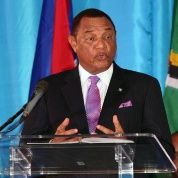The Caribbean Community expressed its support for Venezuela and the continuing energy alliance in the region during its biannual meeting of heads of state held this Thursday and Friday in Nassau, The Bahamas. Regional leaders also condemned the most recent coup attempt in Venezuela from the ultra right wing within the country.

In an interview with teleSUR, Saint Vincent and the Grenadines Prime Minister Ralph Gonsalves said “You cant try to overthrow a democratically-elected government, this is fundamental, you change a government through democratic means, this is a high constitutional principle and we are supporting Venezuela.”
WATCH MORE: Prime Minister Gonsalves in our special report below
Antigua and Barbuda Prime Minister Gaston Browne, who is also the outgoing pro tempore Caricom president, also weighed in on the importance of Venezuela's foreign policy with regard to Caribbean states. He stressed that democracy should be respected and thanked Venezuela’s President Maduro for the financial help the country has given Caribbean nations, especially given the international financial crash.
Browne also called on the U.S. congress to end its “senseless” blockade of Cuba.
Energy was a big theme of this, the 26th biannual meeting of the 15 island nations. Browne explained, “We continue to stand with Venezuela, and, in as much as we accept that there must be some diversification into alternative energy, the reality is fossil fuel will be around for decades to come, so the importance of Venezuela will remain.”
Venezuela, which is also a Caribbean nation, has joined together with its island neighbors in the PetroCaribe venture. In the video above, Suriname's Vice President Robert Ameerali says, “Energy is one of the big issues, Suriname was one of the countries that was in favor of PetroCaribe.”
READ MORE: Caricom: Out With Imperialism, In With Solidarity
While the United States has recently tried lure Caribbean away from PetroCaribe, Browne made it clear that this is not the way Caricom should go. He said that the United States does not hold the answer to the problems in the Caribbean with regard to energy, and that PetroCaribe offers a good solution and it is good for relations between the islands and Venezuela.
Another significant decision made at the meeting was the decision not to renew the Dominican Republic's member status. They stressed that they are not trying to meddle in the country's decision to refuse citizenship to descendants of Haitians, but are making the point out of respect for human rights, and are urging the two contries to discuss their differences. "Caricom continues to condemn this decision which leaves more than 200,000 Haitians born in the Dominican Republic in limbo," said outgoing Caricom chief Gaston Browne.
READ MORE: The Dominican Republic and Haiti, a Shared Legacy
Other decisions were made in agriculture, tourism, the use of medical marijuana, slavery and genocide reparations, and investment in human capital and culture (See below for the final statement). Jamaica, which legalized the consumption and production of small amounts of marijuana this Wednesday, led the call for its neighbors to do the same.
The Caricom member states are The Bahamas, Antigua and Barbuda, Barbados, Belize, Dominica, Granada, Guyana, Haiti, Jamaica, Montserrat, Saint Lucia, Saint Kitts and Nevis, Saint Vincent and The Grenadines, Suriname, and Trinidad and Tobago.
WATCH MORE: A report from 2014 on the ongoing conflict between Haiti and the Dominican Republic